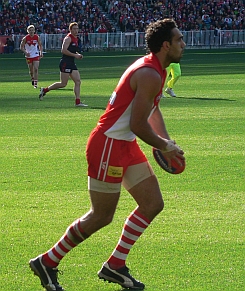Background
Sport historian Colin Tatz, in his 1995 research into Indigenous Australian athletes wrote: "they're Australians when they're winning, and Aborigines at other times", in summarising the history of racism in Australian sport. [1] In his book Obstacle race: Aborigines in sport (1995), Tatz traces racism in Australia sport back to the 1800s. [2] Since the 1990s there have been numerous racial vilification cases reported in the Australian media, partly due to the increase in Indigenous athletes participating in Australian Football League (AFL) [3] and National Rugby League (NRL) and national sports organisations introducing rules to facilitate racial vilification cases.
In an incident in April 1995, Collingwood ruckman Damian Monkhorst racially abused Essendon's Michael Long. An Australian Football League (AFL) investigation after the incident showed that at least 10 players from six clubs regularly racially abused players. [4] After this, the AFL introduced "Rule 30: A Rule to Combat Racial and Religious Vilification" on 30 June 1995 as a result of the shortcomings in Long's racial vilification case against Monkhorst. [5] The Rule stated that: "no player... shall act towards or speak to any other person in a manner, or engage in any other conduct which threatens, disparages, vilifies or insults another person... on the basis of that person’s race, religion, colour, descent or national or ethnic origin". [6] The AFL's rule was the first racial vilification code in Australia sport. The AFL lead the way with its code and subsequently most major national sports organisations introduced their own rules. [7]
These voluntary sporting rules of conduct mirror Racial Discrimination Act 1975 and the Racial Hatred Act 1995 Section 18 C.(1) that: "It is unlawful for a person to do an act, otherwise than in private, if:
"(a) the act is reasonably likely, in all the circumstances, to offend, insult, humiliate or intimidate another person or a group of people; and
(b) the act is done because of the race, colour or national or ethnic origin of the other person or of some or all of the people in the group. to offend, insult, humiliate or intimidate another person or group of people because of their race, colour, or ethnic or national origin". [8]
In 2006, the Australian Human Rights Commission (AHRC) published the report What's the score? A survey of cultural diversity and racism, which stated: [1]
'Racism in sport is a complex problem. It can include: racism, discrimination, harassment or vilification by players directed at other players; by spectators directed at players; or racist behaviour among rival spectator groups which spill over into disruptions and violence in the stands. It also includes the actions of sporting officials and coaches, as well as media commentators.
The AFL has been seen to take leadership in the battle against racism in sport through showcasing an "Indigenous Round'" each year, with the highlight match being Dreamtime at the 'G. [9] The NRL has an "Indigenous Round" and there is an annual game with the Indigenous All Stars. [10]
The Play by the Rules website established in 2001 provides a wide range of resources in racism in sport to assist administrators, coaches, officials, players and parents. [11]
In 2012, the AHRC launched a Racism. It Stops with Me, a community awareness campaign aimed to empower Australians to counter racial prejudice and discrimination. All the major sports organisations – Australian Football League, National Rugby League, Australian Rugby Union, Football Federation Australia, Cricket Australia, Netball Australia and Tennis Australia have become part of this campaign. [7] A television advertisement was produced that included Indigenous and non-Indigenous athletes. [12]
This page is based on this
Wikipedia article Text is available under the
CC BY-SA 4.0 license; additional terms may apply.
Images, videos and audio are available under their respective licenses.


